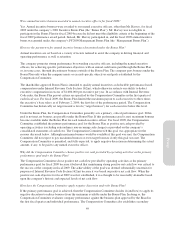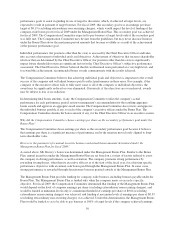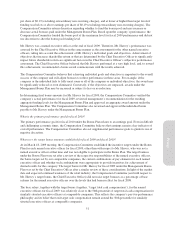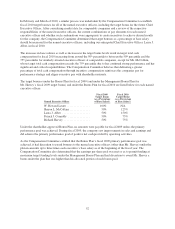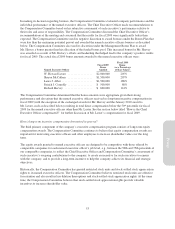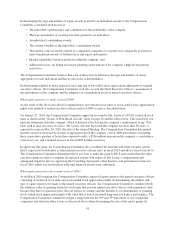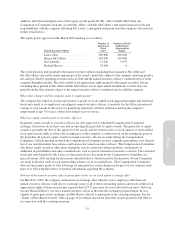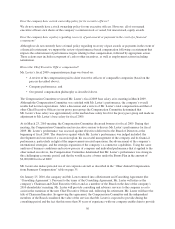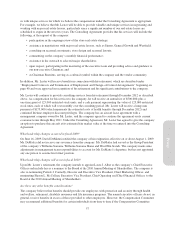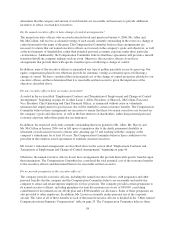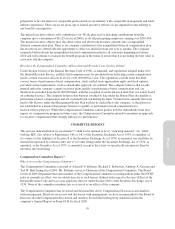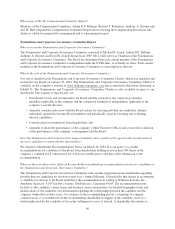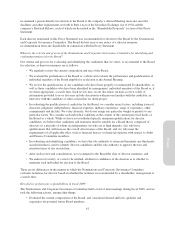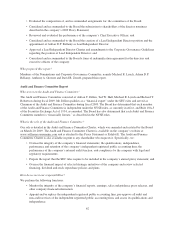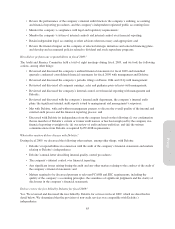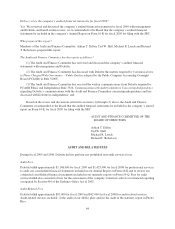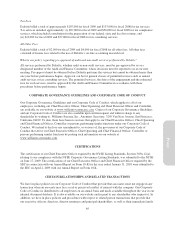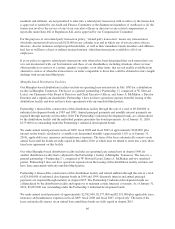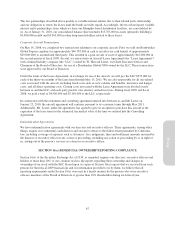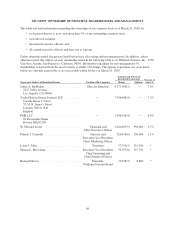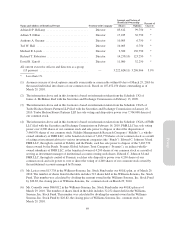Pottery Barn 2009 Annual Report Download - page 153
Download and view the complete annual report
Please find page 153 of the 2009 Pottery Barn annual report below. You can navigate through the pages in the report by either clicking on the pages listed below, or by using the keyword search tool below to find specific information within the annual report.
perquisites to be customary for comparable professionals in our industry with comparable management and retail
industry experience. There are no tax gross-ups to named executive officers on any imputed income relating to
any benefits or perquisites.
The named executive officers who contribute to our 401(k) plan receive matching contributions from the
company up to a maximum of $6,125 (in fiscal 2009), as do all participating employees earning over $245,000.
The named executive officers may also defer salary and short term incentive amounts into a nonqualified
deferred compensation plan. There is no company contribution to the nonqualified deferred compensation plan;
the executives are offered only the opportunity to delay tax inclusion from one year to another. The company
suspended deferrals into the nonqualified deferred compensation plan for all associates beginning in January
2010 and will continue to evaluate the benefit program in the future to ensure that it is providing the best value to
associates and the company.
How does the Compensation Committee address Internal Revenue Code Section 162(m)?
Under Section 162(m) of the Internal Revenue Code of 1986, as amended, and regulations adopted under it by
the Internal Revenue Service, publicly held companies may be precluded from deducting certain compensation
paid to certain executive officers in excess of $1,000,000 in a year. The regulations exclude from this limit
various forms of performance-based compensation, stock-settled stock appreciation rights and stock options,
provided certain requirements, such as shareholder approval, are satisfied. The company believes that awards
granted under the company’s equity incentive plans qualify as performance-based compensation and can
therefore be excluded from the $1,000,000 limit, with the exception of restricted stock units that vest solely based
on continued service. The company believes that bonuses awarded to date under the Bonus Plan also qualify as
performance-based compensation and are excluded from calculating the limit. Certain bonus amounts that were
paid to Mr. Harvey under the Management Bonus Plan will not be deductible to the company, as that plan was
not established in a manner that permits bonuses to qualify as performance-based compensation for
Section 162(m) purposes. While the Compensation Committee cannot predict how the deductibility limit may
impact its compensation program in future years, the Compensation Committee intends to maintain an approach
to executive compensation that strongly links pay to performance.
COMMITTEE REPORTS
The sections indicated below by an asterisk (*) shall not be deemed to be (i) “soliciting material,” (ii) “filed”
with the SEC, (iii) subject to Regulations 14A or 14C of the Securities Exchange Act of 1934, as amended, or
(iv) subject to the liabilities of Section 18 of the Securities Exchange Act of 1934, as amended, nor shall they be
deemed incorporated by reference into any of our other filings under the Securities Exchange Act of 1934, as
amended, or the Securities Act of 1933, as amended, except to the extent we specifically incorporate them by
reference into such filing.
Compensation Committee Report *
Who serves on the Compensation Committee?
The Compensation Committee consisted of Adrian D.P. Bellamy, Richard T. Robertson, Anthony A. Greener and
Ted W. Hall during fiscal 2009. Mr. Bellamy serves as Chairman of the Compensation Committee. The Board
for fiscal 2009 determined that each member of the Compensation Committee was independent under the NYSE
rules as currently in effect, was an outside director as such term is defined with respect to Section 162(m) of the
Internal Revenue Code and was a non-employee director under Section 16(b) of the Securities Exchange Act of
1934. None of the committee members has ever served as an officer of the company.
The Compensation Committee has reviewed and discussed the above Compensation Discussion and Analysis
with management. Based on our review and discussion with management, we have recommended to the Board of
Directors that the Compensation Discussion and Analysis be included in this proxy statement and in the
company’s Annual Report on Form 10-K for fiscal 2009.
59
Proxy


